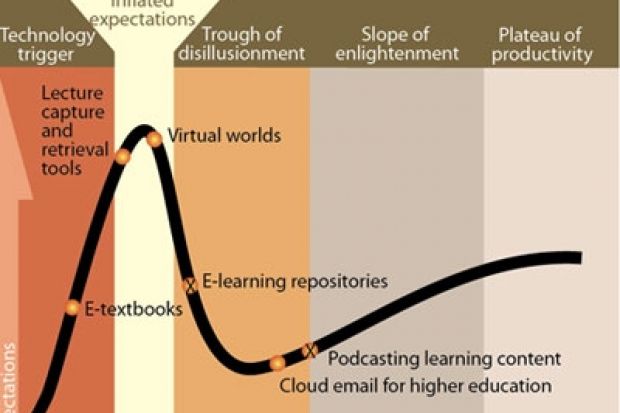Virtual worlds are about to plunge into a "trough of disillusionment", lecture podcasts are fast becoming obsolete, but cloud computing will soon be on the "slope of enlightenment".
These are the findings of an analysis of the "hype cycle" of technology in education, published by Gartner, an IT advisory firm.
The annual study looks at the popularity of emerging technologies, from internet TV and e-books to microblogging sites such as Twitter, across a range of sectors. It tracks their progression as a function of expectations.
The cycle ranges from over-enthusiasm as technology is hyped, through a period of disillusionment when it fails to deliver, via a slope of enlightenment to a "plateau of productivity", as users learn how best to employ it.
The results for the education sector provide some interesting insights.
Virtual worlds - such as Second Life - have passed their "peak of inflated expectations" and are now set to slide into the "trough of disillusionment".
However, Jan-Martin Lowendahl, research director of higher education strategies at Gartner, said the hype had lingered in the university sector longer than elsewhere.
"Virtual worlds are just starting to come down, but they are coming down much more in the commercial world," he said.
"It is obvious the technology has pedagogic advantages - the question is, how is it going to be established as an infrastructure?"
At present, Coventry University is one of the UK's leaders in Second Life, with a presence that includes an island featuring a harbour, a beach and an amphitheatre.
The hype cycle also signals impending doom for the podcasting of lectures and e-learning repositories, which are forecast to become "obsolete before plateau".
Dr Lowendahl said that podcasting was being subsumed by the more general technology of "lecture capture and retrieval", which is rising quickly up the hype scale.
This is based on recording everything, from the lecture to the marks made on the white board, and then indexing it to ensure easy access for students.
"I think this is one of the areas where IT has the most measurable impact on student retention and grades," Dr Lowendahl said.
Meanwhile, e-textbooks make their first appearance as an emerging technology on the 2009 education curve. In the general hype cycle, which highlights trends across all sectors, e-books are at the height of the peak of inflated expectations.
Cloud email for higher education - free email services offered to institutions by the likes of Google, Microsoft and Yahoo - is also firmly ensconced in the sector.
In 2008, the technology was heading towards the peak of inflated expectations, but this year passed through the trough of disillusionment and is now on the slope of enlightenment.
Dr Lowendahl said the technology had seen a "tremendous uptake, especially in higher education". Although cloud email for the sector was launched only in October 2005, the report, published last week, estimates it has a penetration rate of up to 20 per cent.
"I think it is the quickest uptake I have seen of outsourcing in higher education," Dr Lowendahl said.
The cycle is a global analysis, but focuses on the US and Europe.
Register to continue
Why register?
- Registration is free and only takes a moment
- Once registered, you can read 3 articles a month
- Sign up for our newsletter
Subscribe
Or subscribe for unlimited access to:
- Unlimited access to news, views, insights & reviews
- Digital editions
- Digital access to THE’s university and college rankings analysis
Already registered or a current subscriber? Login
